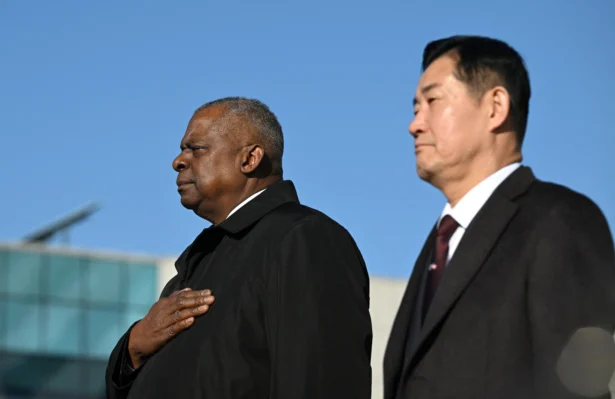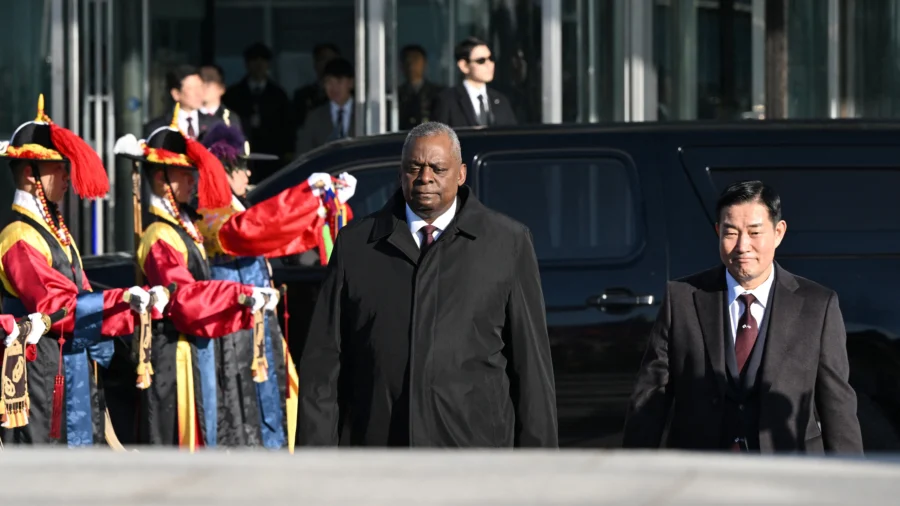Defense chiefs from South Korea, Japan, and the United States agreed on Sunday to initiate a real-time data sharing system that will detect North Korean missile launches, South Korea’s defense ministry said.
The agreement was made during Secretary of Defense Lloyd Austin’s visit to Seoul for the annual bilateral security talks with his South Korean counterpart, Shin Won-sik. Japanese Defense Minister Minoru Kihara joined the talks via video link. The data sharing system is set to be launched in December.
“The ministers of the three countries evaluated that preparations for the real-time sharing mechanism, which is aimed at enhancing each country’s capabilities of detecting and assessing North Korea’s missiles, are currently in the final stage. They have agreed to officially activate the mechanism in December,” the ministry said in a press release.
The three leaders also agreed on planning trilateral military drills to conduct joint training “more systematically and efficiently,” starting in January.
During the meeting, the three defense leaders pledged to cooperate closely in moving toward their shared goal of North Korea’s “complete denuclearization” in line with U.N. Security Council resolutions.
South Korean President Yoon Suk Yeol said at an official dinner the same day that the 3 allies must stand ready for any provocations by North Korea, including a “Hamas-style surprise attack.”
North Korea conducted two test-firings of Hwasong-18 solid-fuel intercontinental ballistic missiles earlier this year, and is believed to be preparing to launch its first military spy satellite following failed attempts in May and August.

Deterrence Strategy Revised
On Monday, South Korean Defense Minister Shin Won-sik and his U.S. counterpart Lloyd Austin vowed to maintain pressure on North Korea despite global distractions.
The two countries’ representatives signed an updated Tailored Deterrence Strategy (TDS) during the second day of the security talks in Seoul, the South Korean defense ministry said.
The revision was considered necessary because the existing strategy did not adequately address rapid advancements in North Korea’s missile and nuclear programs, it said.
First established in 2010, the TDS has taken on greater significance as North Korea has pushed ahead with its ballistic missile and nuclear programs.
The two leaders also said they had agreed to boost joint drills, as well as cooperation with Japan, to deter and better prepare for any North Korean attack.
Reevaluation
Mr. Austin said recent visits by a U.S. nuclear ballistic missile submarine and a B-52 bomber to South Korea were “milestones” in deterrence efforts, and that the tempo of such deployments could continue despite other global crises.
“We will continue to do the things that we’ve promised to do,” Mr. Austin told a briefing, adding that over the past year, the U.S. military had deployed considerable resources to the Indo-Pacific region, and was now “more capable to respond to anything that could happen.”
This year, South Korea and the United States have deepened nuclear planning discussions to better coordinate an allied nuclear response during a war.
Recent changes in North Korean and Chinese capabilities and intentions are likely to “dramatically” increase the risk that U.S. and South Korean deterrence could fail within the next decade, and the allies must undertake major steps to strengthen deterrence, the Atlantic Council think tank said in a study last week.
“Despite conflicts that are happening in many parts of the world, our alliance is the most powerful alliance in history and in the world,” Mr. Shin said at the briefing.
He noted that recent live-fire drills had been the largest in the allies’ history, and that boosting joint exercises would ensure that North Korea can be punished “immediately and powerfully” if it attacks.
Russian President Vladimir Putin said at a recent summit with North Korean leader Kim Jong Un that Russia would help North Korea build satellites, but did not elaborate.
Regarding overnight U.S. airstrikes in Syria, Mr. Austin left open the possibility of more strikes against Iran-linked groups if attacks against American forces in Iraq and Syria didn’t stop. The U.S. military carried out its third airstrike in as many weeks in Syria late on Sunday, targeting a training facility near the city of Albu Kamal and a safe house near the city of Mayadeen.
Reuters contributed to this report.

